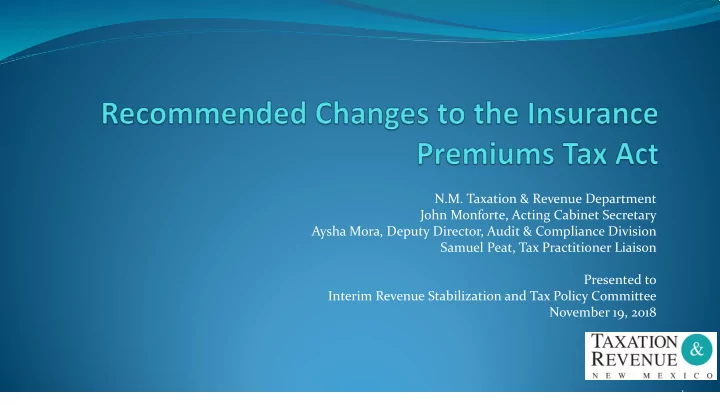

N.M. Taxation & Revenue Department John Monforte, Acting Cabinet Secretary Aysha Mora, Deputy Director, Audit & Compliance Division Samuel Peat, Tax Practitioner Liaison Presented to Interim Revenue Stabilization and Tax Policy Committee November 19, 2018 1
Overview HB 223 Background HB 223/Present Law Summary TRD Concerns About Present Law Recommended changes Under Tax Administration Act (TAA) Outside TAA 2
HB 223 Background 2016/2017 Special Audits: Estimated underpayment of $65 million excluding penalty and interest Limited scope, relied on data from OSI Limited access to insurance company records Recommended form changes and audit initiatives to improve compliance Tax statements not reconciled to Annual Statements Taxpayer balances not reconciled 3
HB 223/NMSA 7-40 Summary 3.003% tax on “gross premiums and membership and policy fees … as reported to the Department … in … the taxpayer’s annual financial statement on insurance…” 1.0% Health Insurance Premiums Surtax Annual payments with quarterly estimated payments Credit for portion of Medical Insurance Pool (MIP) assessments Penalty $1,000/month for failure to file or pay TRD agent for enforcing process Money deposited to Insurance Department Suspense Fund TRD may share information with the OSI 4
TRD Concerns: Lack of Audit Authority Previous TRD presentations outline that under current law, TRD will only have a revenue processing function No audit function is authorized that would enable TRD to verify accuracy of payments Tax is imposed on premiums and fees “reported” by the taxpayer: Literally, TRD would have to accept whatever is reported and assess only for non- payment of reported amounts – this does not address the issues identified by the Special Audits Accountability would depend on the OSI’s examination function – i.e. status quo without the resources OSI is not required to share information with TRD 5
Other TRD Concerns Collection process – TRD as process server – is inefficient and could result in delayed collections; TRD has better processes that protect taxpayers’ rights while enabling efficient collections Lack of a Statute of Limitations: This exposes both the taxpayers and the State to unpredictable liabilities Revenues should be managed by TRD to enable accountability and transparency Lack of independent hearings for review of Department actions Lack of Taxpayer Bill of Rights Penalty provisions are not tied to liabilities 6
Recommended Changes: Apply TAA By applying TAA (statute and regulations): Clear and consistent guidelines for taxpayer registration, return filing, payment methods and deadlines, return and revenue processing, audit assessment and abatement, collection, refund claims, managed audit, taxpayers’ rights, confidentiality, fraud prevention, protest options and procedures, independent hearings for appeals, Statute of limitations (3 years), taxpayer remedies, etc. These statutes and rules apply to virtually every other tax and type of business in the state, enabling the Legislature to insure equal treatment 7
TRD Recommendation to Committee: Apply TAA with Additional Changes to Premiums Tax Act Clarify definition of tax base: not simply “premiums and fees reported” Require OSI to share information concerning premiums tax liability with TRD Create “Premiums Tax Suspense Fund” managed by TRD and authorize distributions of net revenue (§ 7-1-6) Add to taxes for which electronic payments are required from those with large liabilities (§7-1-13.1) Clarify source of definitions for all terms that reference the insurance code Modify confidentiality to enable reciprocity provisions Clarify base for MIP credit and require reporting 8
Changes Needed if TAA is Not Applied TRD identified 31 issues that should be addressed by statute or regulation Some of the major issues to address: Taxpayer registration Required information reporting/sharing Audit/refund/protest/independent hearing processes Penalty and interest – make a function of liability Fund management to TRD Statute of limitations Taxpayer rights and remedies Tax fraud prevention 9
Administrative Concerns January 1, 2020 effective date Personnel numbers only sufficient for revenue processing functions TRD will begin accounting on transfer date and will not reconcile previous OSI account numbers If necessary, system changes in GenTax are estimated to take more than 12 months and cost $6 million in project costs New OSI system utilized to accept payments Many manual processes currently in place System changes only make sense if a replacement statute takes place in the 2019 legislative session 10
Summary and Conclusions HB 223/NMSA 7-40 was intended to address serious deficiencies in Premiums Tax administration Current provisions are incomplete in many ways and would likely fail to achieve the legislation’s purpose Best practice: Apply provisions of the Tax Administration Act Alternative: replicate many TAA provisions in Premiums Tax Act and Insurance Code: Creates potential for statutory conflicts and unequal treatment 11
Recommend
More recommend